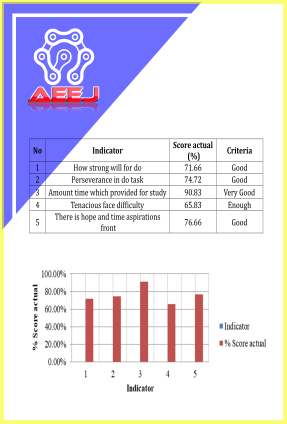The Use of YouTube Media in Increasing Motivation for Students in the Distance Learning Period
##plugins.themes.academic_pro.article.main##
Abstract
The purpose of this study is to provide assistance to students in understanding the material presented by the teacher during the period during course. The method applied in this research is descriptive qualitative method. The population group studied were students taking the Automotive Simulation and computing course in the odd semester of the 2021/2022 academic year, who were enrolled in the Automotive Engineering Education study program at the Faculty of Engineering, UNP. The results of the study show that the use of video media in the form of course via YouTube makes a positive contribution to the course process and understanding of the material for students. The responses from students to the use of video as a course tool for Simulation and Computing showed that 85.66% of them responded well, while 14.34% responded at a poor level. The results of the study show that 50.8% of students have a "good" rating, 8.73% get an "very good" assessment, and 40.47% are in the "enough" category.
##plugins.themes.academic_pro.article.details##

This work is licensed under a Creative Commons Attribution 4.0 International License.
References
[2] A. Hasan, “Motivasi Belajar Dan Faktor-Faktor Yang Berpengaruh: Sebuah Kajian Pada Interaksi Pembelajaran Mahasiswa,” J. Mhs., vol. 1, no. 2, pp. 100–109, 2011, [Online]. Available: http://e-journal.unipma.ac.id/index.php/PE/article/view/39/37.
[3] N. Hidayat, “Car Air Conditioner System Simulator Design for Student Practicum Perancangan Simulator Sistem Air Conditioner Mobil Sebagai Alat Praktikum Mahasiswa,” pp. 151–160, 2023.
[4] H. Tohari, Nf. Mustaji, and B. S. Bachri, “Pengaruh Penggunaan Youtube Terhadap Motivasi Belajar Dan Hasil Belajar Mahasiswa,” Kwangsan J. Teknol. Pendidik., vol. 7, no. 1, pp. 1–13, 2019, doi: 10.31800/jtp.kw.v7n1.p1--13.
[5] S. Rahman, “Pentingnya Motivasi Belajar Dalam Meningkatkan Hasil Belajar,” Merdeka Belajar, no. November, pp. 289–302, 2021.
[6] Z. Zulhijah, “The use of YouTube media in improving the English ability of students in class XI IPA SMA Negeri 9 Rejang Lebong,” Ellite J. Educ. Linguist. Lit. Lang. Teach., vol. 3, no. 1, pp. 1–10, 2020, [Online]. Available: https://ejurnalunsam.id/index.php/ELLITE/article/view/2451/1763.
[7] E. Gil-Cordero, C. Rodriguez-Rad, P. Ledesma-Chaves, and M.-E. Sánchez del Río-Vázquez, “Analysis of factors affecting the effectiveness of face-to-face marketing learning via TikTok, YouTube and video conferencing,” Heliyon, vol. 9, no. 7, p. e17195, 2023, doi: 10.1016/j.heliyon.2023.e17195.
[8] N. Hidayat, A. Arif, M. Y. Setiawan, and W. Afnison, “Peningkatan Pengetahuan dan Keterampilan Pemuda Putus Sekolah Melalui Pelatihan Perawatan Berkala Sepeda Motor,” vol. 18, no. 2, pp. 83–90, 2018.
[9] H. Hidayat, S. Islami, and F. Edya, “Developing an Entrepreneurship Module by Using Product-Based Learning Approach in Vocational Education,” Int. J. Environ. Sci. Educ., vol. 12, no. 5, pp. 1097–1109, 2017.
[10] M. Elareshi, M. Habes, E. Youssef, S. A. Salloum, R. Alfaisal, and A. Ziani, “SEM-ANN-based approach to understanding students’ academic-performance adoption of YouTube for learning during Covid,” Heliyon, vol. 8, no. 4, p. e09236, 2022, doi: 10.1016/j.heliyon.2022.e09236.
[11] D. Wijayanto, “Peningkatan Motivasi Belajar Siswa Melalui Penerapan Model Problem Base Learning (PBL) dan Media Tayangan Youtube Masa Pandemi Covid-19,” Pros. Semin. Nas. Manaj. …, pp. 514–522, 2021, [Online]. Available: https://jurnal.ustjogja.ac.id/index.php/semnasmp/article/view/10658%0Ahttps://jurnal.ustjogja.ac.id/index.php/semnasmp/article/download/10658/4862.
[12] F. Fahmalatif, A. Purwanto, E. Siswanto, and J. Ardiyanto, “Exploring Barriers and Solutions of Online Learning During the Covid-19 Pandemic By Vocational School Teachers,” J. Ind. Eng. Manag. Res., vol. 2, no. 2, pp. 53–63, 2021.
[13] N. Hidayat, A. P. Utami, F. S. Busro, F. Rahmadani, and W. Abdillah, “Implementasi Pendidikan Karakter Sebagai Kontribusi Pembangunan Generasi Berkelanjutan Bagi Anak Nagari Kampung Dalam,” vol. 1, no. 2, pp. 72–80, 2023.
[14] S. Hastuti, “Persepsi Guru Dalam Melaksanakan Pembelajaran Daring (Dalam Jaringan) Pada Masa Social Distancing (Wabah Covid-19),” vol. 3, no. 2, p. 6, 2021.
[15] A. Nursobah, U. Dedih, Hafid, and Nurhamzah, “Dampak Pembelajaran Daring terhadap Penguatan Literasi Informasi dalam Budaya Akademik Mahasiswa,” UIN Sunan Gunung Djati, pp. 1–8, 2020.

